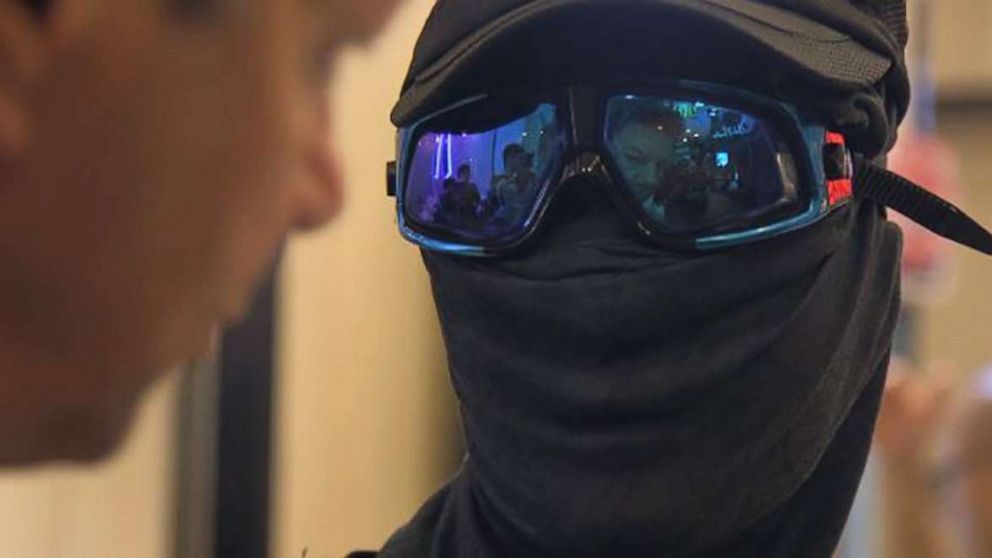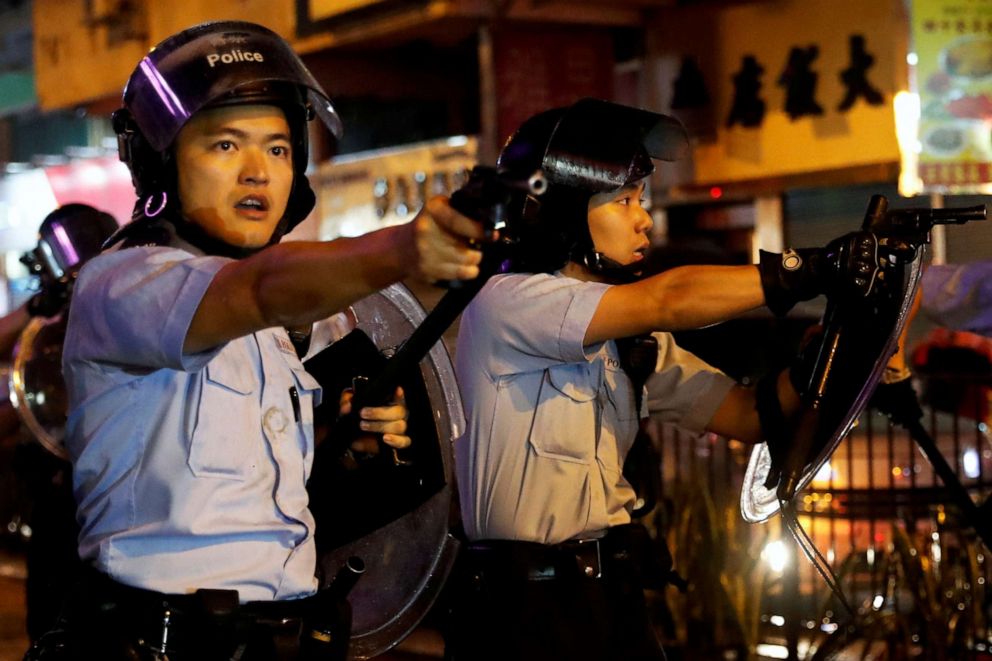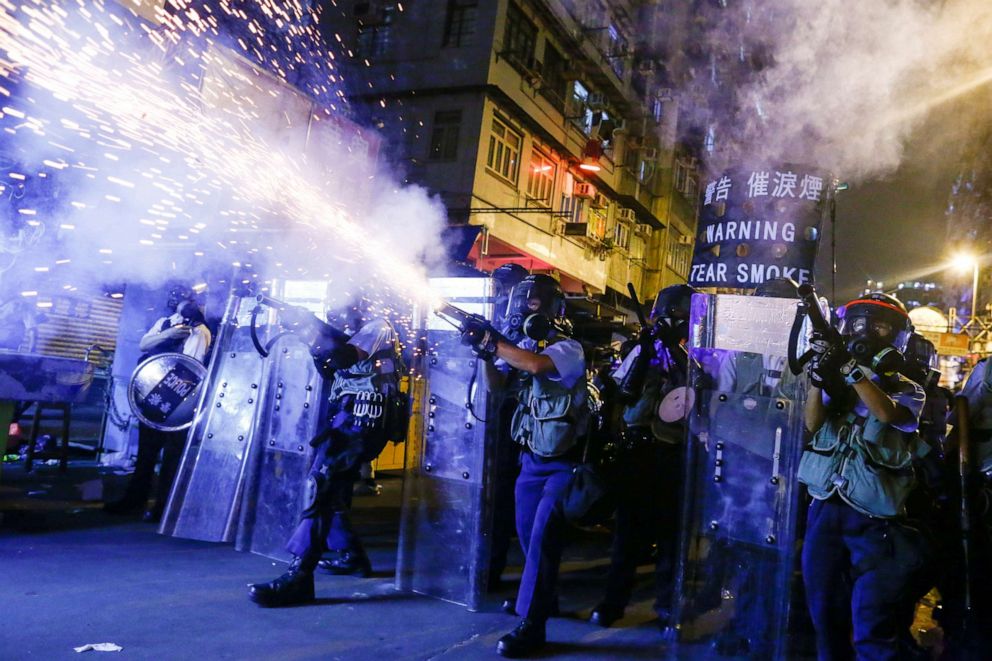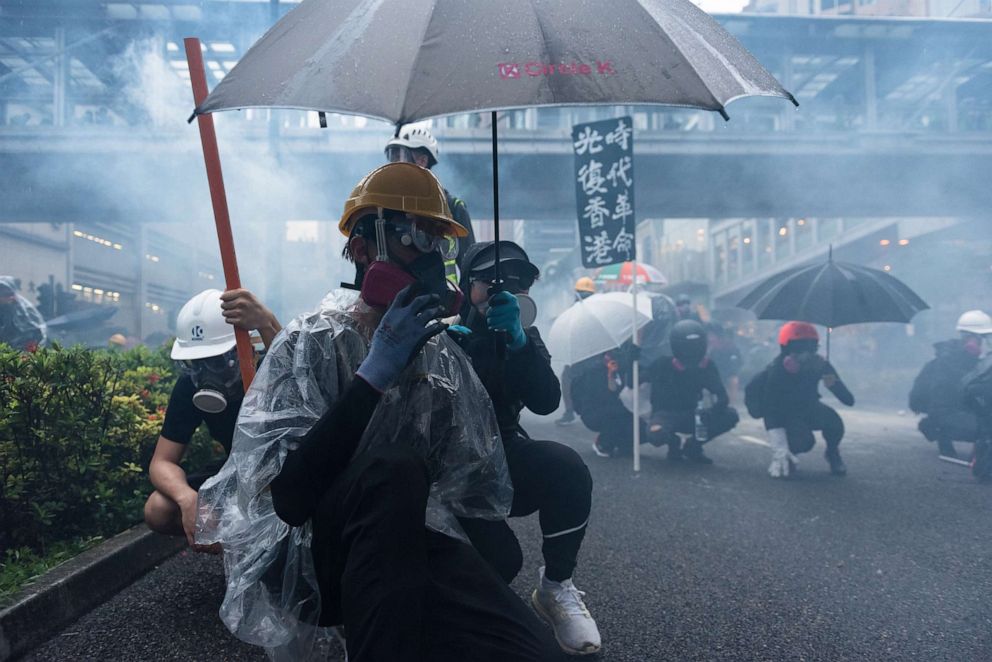'Citizen X': On the front lines of the battle for freedom in Hong Kong
ABC News' Ian Pannell reported from the front lines of the Hong Kong protests.
"Some may live and some may fall, but we will give all we can."
It has become something of an anthem for the youth of Hong Kong, who believe they are now engaged in an existential struggle for the future of this small, high-rise patch of east Asia.
He is a student, but I cannot tell you what he is studying. He is young, but I cannot tell you his age. He is a man, but I cannot tell you his name because of his fear for his safety. I have dubbed him "Citizen X."
I met Citizen X and his comrades on the front lines of a massive protest march in Hong Kong on Aug. 18 that organizers claim attracted 1.7 million people. Sparked by controversy over a proposed extradition agreement that would allow individuals to be sent to mainland China for trial, the protests have come to symbolize much more -- the future of Hong Kong and how much autonomy it has from China.

The tightly-knit group was in a dark huddle discussing tactics. Should they stay and confront the riot police threatening to disperse them, or leave peacefully as some in the crowd -- 2,000 or so strong at that point -- were urging them to do?
Clad in black, with helmets, face masks, protective padding and backpacks, Citizen X and his crew were an intimidating sight: part ninja, part Manga warriors. They are part of a hardcore cadre of thousands of like-minded young activists who were often seen at the vanguard of these protests. They say that they are ready to defend and ready to fight if needed and know they could pay for this with their liberty or even their life.
“I think this is a risk worth taking,” Citizen X told me a few days later at a secret meeting in a darkened room. He did not want to be filmed up-close for fear of being identified, what he and others call a “white terror” -- the fear of being singled out and detained through the use of facial recognition technology. Being found guilty of “rioting”, a term he and almost all protesters hotly dispute, carries a term of imprisonment of 10 years.
“I think this is a risk worth taking” -- Citizen X
Citizen X told me he was mentally prepared for some months in prison but admitted that 10 years would be hard. Still, he said this was something he had to do. “Even though there is a risk, even though we may eventually get the punishment that we do not want to get, we will not give up," he said.
Was his life worth the risk? He didn't hesitate to answer. “I think that is a risk worth taking because we cannot just think about ourselves,” he said. “We will give all we can give because we want to see a free world in our city and in our home. Freedom is never free and that is why we need to take the risks for the greater good for all the Hong Kong citizens."
Make no mistake, this is about much more than the proposed extradition law that sparked the latest round of protests. For the majority, it is about guaranteeing the freedom and democracy they feel they were promised after the handover from British to Chinese rule in 1997, but for a minority it is about something that sets off alarm bells in Beijing: independence.
Hong Kong is something of a puzzle that barely makes sense. It is part of China and therefore belongs to a one-party, communist state that depends on authoritarian rule. But under the "one country, two systems" arrangement that followed the handover, the territory is governed separately and guaranteed the kind of democratic freedoms unimaginable just across the border in the mainland.
Home to some 7 million people, it is one of the world’s leading financial capitals. While China no longer relies quite so heavily on Hong Kong for its prosperity, there is much it stands to lose if the local security forces lose control of what happens here. It is not just the financial cost that would be considerable, with the potential for capital flight, the closing of markets and banks to Chinese businesses and billionaires, it is the potential risk of protest fever spreading to the mainland.
President Xi Jinping appears to have a very dim view of the downfall of the Soviet Union and what he regards as the key mistakes that precipitated its downfall. And China, in its 70th anniversary year, will likely want the protest movement dealt with by Oct. 1, the country's National Day.
The protesters say they have five key demands, plastered on posters across the city and "air-dropped" into people's phones: withdraw the extradition bill that triggered this latest round of protests, establish an independent inquiry into police actions, stop describing the protests as riots, drop all charges against protesters and introduce universal suffrage.

Ronny Tong -- a politician and adviser to Carrie Lam, Hong Kong’s embattled chief executive, the highest political position in a pro-Beijing government -- is advocating a South African-style truth and reconciliation commission as a way out of the impasse with the protesters, but admits the situation at times is hanging by a thread, he said in an interview.
Last Sunday, the police drew their weapons, firing into the air with live ammunition for the first time. It appears to be a dangerous new landmark. Tong said he feared that if the police open fire and people are killed then, “the whole situation might explode and there may be a situation where by Beijing will say enough is enough and so I will have to step in," he said.
China has made it clear that while it believes the local government can handle the crisis in Hong Kong, it will not sit back and watch if the situation becomes uncontrollable.
Speaking earlier this month, Liu Xiaoming, the Chinese ambassador to London, issued a stark warning: “We have enough solutions and enough power to put this to an end”. Chinese paramilitary police have also been filmed by the government staging exercises just across the border on Shenzen, in what many regard as a thinly veiled threat.
This is not the first time Hong Kong has witnessed massive pro-democracy demonstrations. But the "umbrella revolution" of 2014 saw sharp divisions between the nonviolent protesters and the more hard-line elements. Tong admitted that this time. the groups are working together and supporting each other, making this situation much more formidable.
After a day of violence last Sunday, we witnessed bystanders in a shopping mall applauding the protesters and others stood in the rain, berating the police. The failures of the past also appear to explain why this has become a zero-sum game for the demonstrators whose slogan is “it’s now or never."

I met Citizen X again last Sunday as he and his crew were gearing up for the end of a march and what looked to be a standoff and confrontation with the police, breaking a hiatus of almost two weeks. He stated that the Aug. 18 demonstration was peaceful, but the "government doesn’t respond.” "That is why we need a further expression of our demands by more aggressive means,” he added.
Citizen X weaved through the crowd to the front of the standoff. The riot police were already gathered, facing our direction. He pulled out his gas mask and helmet and thick gloves to protect against incoming tear gas. The police unfurled the first of a series of banners used to warn the crowds away.
It was the red flag, “STOP CHARGING OR WE USE FORCE."
Wheelbarrows full of bricks, jemmied from the sidewalk by protesters, were wheeled forward to a makeshift barricade that seemed to grow by the minute. The mood was taut. Everyone expected trouble.
Then the black banner was unfurled, “WARNING, TEAR GAS”.

It was now no longer a matter of whether, but when.
Citizen X compared his struggle to that of America’s fight for independence. “Today in the eyes of the communist government we are just a group of rioters. But I believe that the Founding Fathers initially were also seen by the British, by the colonial rulers as rioters,” he said.
“Will they see us as rioters or will they see us as founding fathers," he wondered. "That will be determined by our actions in the future months in the coming protests.”
Just then, the orange banner was unfurled, “DISPERSE OR WE FIRE.”
At that moment, there seemed little way out of this impasse that risks becoming ever-more confrontational. This is all or nothing for the protesters. Citizen X wanted us to understand there is now no turning back. “We cannot give up and back down at this stage,” he said.
The crowd roared and Citizen X disappeared in a pall of acrid smoke from a relentless barrage of tear gas as a pitched battle for the future of Hong Kong raged and burned long into the night.
Karson Yiu, Patrick Sum, Alan Kwok, Justin Solomon and Caroline Kwok contributed reporting.




